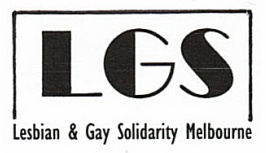


From Canberra Times:
Without debate, increased rights for foreign investors will undermine our way of life, writes Thomas A. Faunce.
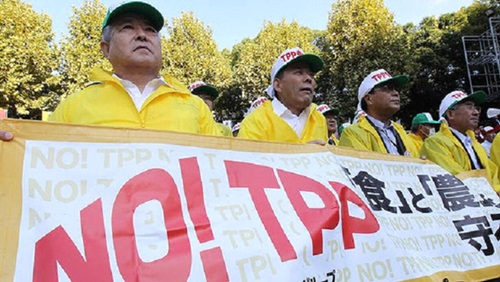
All the indications from the recent Singapore meeting on the Trans Pacific Partnership Agreement (TPPA) are that Australian society is about to undergo a momentous shift in its governance arrangements. The recent Korea-Australia Free Trade Agreement (KAFTA) gives a pointer.
It includes an investor-state dispute settlement mechanism. This provides rights of foreign investors (additional to those of local businesses) to challenge our legislation where it impedes their profits overseas before panels of trade arbitrators. Our government claimed it had ''ensured the inclusion of appropriate carve-outs and safeguards in important areas such as public welfare, health and the environment.''
The Australian government has no mandate to introduce such a significant change in our sovereignty and governance. Though the present author and others raised the issue of such greater rights of foreign investors over local businesses during the preceding electoral campaign it was never the subject of major policy debate or positioning.
The insertion of such foreign investor rights into our governance system is a momentous event in the history of our democracy. According to the central document in our social contract, fundamental alterations in Australia's governance arrangements require not just legislation but a referendum. Thus, a majority of Australian citizens in a majority of states were needed to support the creation of the Pharmaceutical Benefits Scheme or the citizenship of Aboriginal Australians. Yet, as a result of the TPPA, this country risks displacing the authority of citizens who live and support families, friends, local communities and ecosystems in this land, in favour of a system privileging artificial people called corporations.
The multinational corporations to which the KAFTA and the TPPA will be ceding rights to challenge our democratic laws are regarded by the law as ''people''. They can sue in courts to protect their rights. But they lack conscience, empathy, the capacity to develop virtues though consistent application of generally applicable principle, that constitute the richness of our character. Corporations can never marry or have children. They seek to fulfil a monomanical basic craving - to maximise shareholder profit.
Perhaps the big issue in our nation should not be gay marriage, but corporate marriage - using the corporations law to link a broader public purpose.
It is ironic and sad that the privileging of corporate elites over the rights and interests of our citizens implicit in such foreign investor rights was rejected by conservative former prime minister John Howard at the time of the Australia-United States Free Trade Agreement in 2004. It also has been deprecated by Pope Francis as part of his recent apostolic exhortation.
Pope Francis decried the exponentially increasing gap between the salaries of rich and poor which results from ''ideologies which defend … financial speculation … widespread corruption and self-serving tax evasion'' so that ''whatever is fragile, like the environment, is defenseless before the interests of a deified market, which become the only rule.''
So we are in the middle of one of the biggest governance debates our country will ever have. And how much time how our leaders allowed for this debate to take place?
US negotiators created an artificial deadline at Singapore Ministerial conference between December 7 and 10 last year. When this failed, they moved the finalisation of the deal to the sidelines of the World Economic Forum at Davos.
We had indications before that ''carve outs'' would be the order of the day for Australia on TPPA investor rights. At the November 21 Senate foreign affairs, defence and trade legislation committee last year, a high-ranking official stated: ''The government has made it very clear that they would not agree to anything in the TPPA, or indeed any other FTAs, that would undermine the Pharmaceutical Benefits Scheme or indeed Australia's healthcare … the investor-state dispute settlement provisions, as they have evolved, do preserve the ability of governments to regulate in the interests of the public; for example, for public health objectives or the environment.''
This admits that our national sovereignty is not preserved outside such explicit exclusions. Another consequence is that foreign corporations are disrespecting our commitment to establish the rule of law in this country.
At the same time as foreign investors are gaining these extra rights, our government is preparing to turn more of our social infrastructure over to them. The new era for infrastructure financing involves projects financed by taxpayers and superannuants, that then are sold to private corporations who manage them.
The Coalition and Greens have now agreed to remove legislative limits on federal government debt. This is in the context of the Treasurer establishing the National Commission of Audit and reviewing ''the extent, condition and adequacy'' of Commonwealth sector infrastructure according to principles such as respect for taxpayers, living within means and doing for people ''what they cannot do, or cannot do efficiently for themselves, but no more.''
This debt will be used to fund infrastructure projects (for example airports, fast train, road, tunnel and national broadband projects) with foreign investors then buying that debt in the form of fully redeemable and guaranteed government converting infrastructure bonds.
These can then be traded on the markets such as the cover bond market and convert to private equity (shares) held in the main by private corporations and superannuation funds that then manage and gain profits from the ongoing utilisation of the infrastructure. When investors want to cash in their bonds, the government will have to pay them out with more asset sales. One day, all our government assets will be sold off. They'll be owned by foreign corporations that have rights to challenge overseas our attempts to regulate them in the national interest. What will be left of our national pride at this time? When our corporate-led government has so thoroughly disengaged itself from its citizens, will they fight to support it?
The deliberate disengagement of Australian citizens from the governance changes being wrought on Australia through the TPPA may mark a turning point in a wider disengagement of citizens from the political process in this country.
? Thomas A. Faunce is professor, jointly in the college of law and college of medicine, biology and the environment at the Australian National University.
From Nation of Change:
The president and transnational corporations will make an aggressive push to pass Fast Track this month, but it is our job to stop them and make it impossible to bring Fast Track or the TPP up again.
The White House is calling January “TPA (Trade Promotion Authority) Month” and has made it their task to pass Fast Track. President Obama needs Fast Track to pass the Trans-Pacific Partnership (TPP). When Congress returned this month, a bill was quickly introduced after delays of more than a year.
The lies begin with title of the bill: “The Bipartisan Congressional Trade Priorities Act of 2014.” Bi-partisan? In the House there was only one sponsor, Republican David Camp (MI). The Republicans demanded the Democrats add a sponsor before it was introduced, but due to public pressure, they could not find one.
The only Democrat on the bill in the Senate is Max Baucus (MT) — the senator who gave us the Bush tax cuts for the wealthy and who is leaving the senate to become Ambassador to China. So, the bill is only bi-partisan until he heads off to his new job.
Baucus likes to informally call the bill “The Job Creating Bipartisan Trade Priorities Act,” but that just adds another lie since trade agreements consistently lose jobs, expand the wealth divide and increase trade deficits.
TPP Loses MomentumAfter four years of secret negotiations with more than 600 corporate advisers, the once seemingly invincible largest trade bill in history, covering 40% of the world’s economy , looks very much like it can be defeated.
Why is the TPP looking like it can be stopped? One reason is its secrecy.
Leaks are sinking the TPP like the Titanic on its way to the bottom of the ocean. Ron Kirk, the former US Trade Rep said they were keeping it secret because the more people knew, the less they would like the TPP and it would become so unpopular it could never become law.
Each leak has proven him right.
This week, Wikileaks published the Environmental Chapter. The bottom line – there is no enforcement to protect the environment. The TPP is worse than President George W. Bush’s trade deals. Mainstream environmental groups are saying the TPP is unacceptable.
Similarly, the leak of the Intellectual Property Chapter revealed that it created a path to patent everything imaginable, including plants and animals, to turn everything into a commodity for profit. The Obama administration was pushing it way beyond normal intellectual property law in order to increase profits for everything from pharmaceuticals to text books.
The refrain is always the same: profits come first. The necessities of the people and protection of the planet come last.
Backlash in Congress to Fast TrackBaucus announced last March that he would deliver Fast Track by June. Pressure delayed it so that now the bill is being introduced in the beginning of an election year. Election years are a terrible time to pass anything controversial.
The TPP is becoming politically toxic. Over the last year there has been a steady stream of emails and phone calls to Congress. Members have faced constituent meetings and protests where TPP is being raised. Some examples of protests: Los Angeles, Seattle,Washington, DC, Salt Lake City,Minneapolis, US Trade Rep Office, Vancouver, Leesburg, New York City . . . we could go on. Americans have sent a clear message to members of Congress that they better not be associated with the TPP in an election year.
When Fast Track was introduced there was a backlash, according to public reports, of angry Democrats. Rep. Earl Blumenauer (D-OR) told Huffington Post: “I’m a little disappointed that something’s dropped that was never discussed with Democrats in the House. As I understand it, it wasn’t actually discussed with Democrats in the Senate.”
Five members of the Senate Finance Committee told US Trade Representative Mike Froman they will not support the Baucus Fast Track bill because Congress needs to be involved throughout the process not just in an up or down vote after it is completed.
During a hearing on Fast Track on Thursday protesters were there expressing their displeasure.
Baucus says he will not be holding a mark-up of the bill because of the divisions on the Finance Committee. Sen Ron Wyden (D-OR) who will be taking Baucus’ place told Politico there was “broad frustration” with the lack of transparency. . Majority Leader Reid has put fast track on a slow track in the senate saying he does not plan to bring it to the Senate Floor, saying there was too much controversy around it.
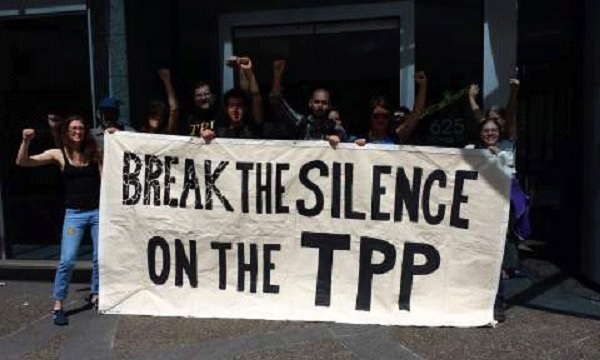
As bad as the Senate sounds for the administration, the House is even worse. Opposition has been building in recent months with Democrats and Republicans writing President Obama opposing Fast Track.
They could not find a Democratic co-sponsor and now Politico reports that Speaker Boehner says he will not bring the bill to the floor for a vote unless 50 Democrats support it.
State of the Union: Last Stand for Fast Track of TPP?The president’s TPA month is off to a bad start, so he has to make a big pitch in his upcoming State of the Union on January 28. If he doesn’t, it is a sign he has given up and is distancing himself from defeat. He’s not only going to have to persuade almost every Republican to support him (that would be a first for his presidency), he’s going to have to convince every Democrat who has not taken a position, and change the minds of many who have already publicly said they oppose Fast Track.
The problem is Members of Congress know that if they get on the wrong side of corporate trade agreements, it will hurt them politically. The public is angry about this job-killing trade deal, even Minority Leader Pelosi has had her events interrupted by TPP protesters. In fact, an event in Los Angeles with President Obama, Nancy Pelosi and Harry Reid had hundreds of TPP protesters. The social movement against corporate trade is coming across loud and clear leading top House Dems to describe it as “dead on arrival” if it does not protect labor and the environment. We know from the Environment Chapter, it does not protect the environment. Major unions oppose the TPP because it is evident, like all corporate trade, it will be a bad deal for labor since a major goal is lower wages.
The views of many in Congress were summarized in a statement by Democratic Reps. George Miller (CA), Louise Slaughter (NY) and Rosa DeLauro (CT): “Our constituents did not send us to Washington to ship their jobs overseas, and Congress will not be a rubber stamp for another flawed trade deal that will hang the middle class out to dry.”
Members of Congress have seen the research that shows 90% of Americans will see their income go down from the TPP while the wealthiest get wealthier. Why would any Member of Congress want to sign on to something like that – especially in an election year?
Congress should oppose Fast Track because it is an Obama power grab. Under the Baucus-Camp bill the Congress will have 90 days to review the agreement. The House will have 60 days and the Senate will have an additional 30 days. The count begins when the White House decides the negotiations have been completed.
Under the Baucus-Camp Fast Track the president is also able to draft extensive implementing legislation to bring US law into compliance with the agreement. It is up to the president to decide what changes in laws or new laws are needed to comply with the TPP. Congress is not able to mark-up or amend the language of these bills. And, these can be very significant laws. For example, provisions like “Buy American” or “Buy Local” can be repealed as a restraint on trade. In all of these cases under Fast Track the president becomes the Congress and drafts legislation, totally destroying the checks and balances of the three branches of government.
As some anti-TPP activists in Los Angeles showed in a great street theater action in front of the offices of Rep. Xavier Becerra (D-CA), Fast Track makes Congress unnecessary. They brought the “TPP movers” to his office and outsourced him. It is important for activists to know what is in Fast Track because the US Trade Representative has been doing its best to mislead the public.
Time to Finish the Job, Make Fast Track for the TPP Politically ToxicThe movement against the TPP has come a long way in the last year from challenging a trade agreement that no one knew about and looked like it could not be stopped; to a trade agreement widely known about in activist circles and which is becoming too toxic for elected officials to be associated with in an election year.
The reason we have come this far is because the TPP affects so many aspects of every person’s lives – food, the environment, workplaces, the Internet, banking and finance, job availability, health care, energy, the list goes on and on. As people learn about the TPP and what it does they oppose it. While lame ducks like Obama and Baucus who do not have to seek re-election can ignore angry constituents and follow the demands of big money, those seeking re-election do not have that luxury.
Our task: We need to continue to build opposition and show elected officials they do not want to be associated with these toxic trade agreements. They need to understand that fast-tracking the TPP could end their career.
A lot is already planned. To stay informed “like” the Flush The TPP Facebook page and follow the twitter feed where we will be regularly publishing new sharable memes to continue to build the stop the TPP movement. If more TPP leaks come out, we’ll provide immediate analysis. If there are hearings we will organize protests to make sure the voices of opposition are heard and share that information.
Every Tuesday there is a TPP twitter storm at 9 PM Eastern. Follow the hashtag #TPPMediaMarch to participate. There will be a special TPP storm during the State of the Union on January 28.
Scores of organizations have come together in a movement of movements to create a webpage StopFastTrack.org. We’ve planned ten key days of pressure on Congress from January 22 to January 31. During this period, people will be making phone calls to Congress through the website which will provide simple tools to call Congress. In addition, during this period, people are organizing for the State of the Union on January 28 and an Inter-Continental Day of Action on January 31. During the State of the Union, people opposed to the TPP plan to stand vigil outside of the Congress beginning at 8:30 PM so they can be there when the president arrives for the speech that begins at 9 PM. During the speech a special State Of The Union TwitterStorm will be held from 9-10pm EST, follow #TPPMediaMarch to participate.
On January 31 there will be an Inter-Continental Day of Action against the TPP & Corporate Globalization. The theme is ‘No More NAFTA’s as this month is the twenty-year anniversary of NAFTA, which has had devastating consequences for working families, small farmers, indigenous peoples, small business and the environment in all three countries and beyond. The TPP is fairly described as “NAFTA on Steroids.”
We have come an incredible distance and the likelihood of stopping the TPP is stronger than it ever has been. The president and transnational corporations will make an aggressive push to pass Fast Track this month. It is our job to stop them and make it impossible to bring Fast Track or the TPP up again. We can accomplish this and when we do it will be a tremendous victory of the people over transnational corporate power!
This article is produced by PopularResistance.org in conjunction with AlterNet. It is based on PopularResistance.org’s weekly newsletter reviewing the activities of the resistance movement.
Kevin Zeese, JD and Margaret Flowers, MD are participants in PopularResistance.org; they co-direct It’s Our Economy and co-host Clearing the FOG. Their twitters are @KBZeese and MFlowers8.Kevin Zeese is an attorney who has been a political activist since graduating from George Washington Law School in 1980. He works on peace, economic justice, criminal law reform and reviving American democracy. His twitter is @KBZeese. Zeese has used his law degree to work to end the war on drugs, stop the use of the military and National Guard in drug enforcement and allow the medical use of marijuana. He has filed bar complaints against lawyers in the Bush and Obama administrations who used their legal degrees to justify torture, as well as against Justice Clarence Thomas for conflicts of interests. He has also filed complaints against attorneys at Hunton and Williams who worked with the Chamber of Commerce and HB Gary Federal to target him for his work criticizing the Chamber. Zeese serves on the steering committee of the Bradley Manning Support Network. Zeese filed a complaint with the Justice Department against Rupert Murdoch and News Corp for violations of the Foreign Corrupt Practices Act as well as with DOJ against Karl Rove’s American Crossroads for violating the non-profit tax laws and the federal election laws.
ABOUT MARGARET FLOWERSMargaret Flowers, M.D. is a pediatrician and mother of 3 teens from Baltimore, MD. Margaret left medical practice in 2007 to advocate full-time for single payer health care. She served as Congressional Fellow for Physicians for a National Health Program and is on the board of Healthcare-Now. She is co-director of ItsOurEconomy.us. She has organized and participated in protests for health care, peace and economic justice which have included arrests for nonviolent resistance.

From Care2 and TreeHugger:

The Trans-Pacific Partnership is a trade deal being negotiated among twelve countries around the Pacific Rim. The terms of the agreement have been discussed largely in secret for the past three years, yet President Obama has deemed passing the agreement a top trade priority.
This past week, WikiLeaks released a draft of the trade agreement’s environmental chapter, along with that chapter’s working group chair report. A number of environmental groups say the leaked documents are too soft on several key environmental issues.
1) Pollution controlsEnvironmental groups are taking issue with the process for prosecuting violators of environmental agreements. The trade agreement does not impose any explicit penalties for “non-compliance,” but rather sets up a system where parties that suspect wrongdoing can request that a committee “consider whether the matter could benefit from cooperative activities under this agreement.” That seems like a pretty toothless way to handle polluters of any kind.
A statement from the World Wildlife Federation, the National Resources Defense Council, and the Sierra Club concludes, “this vastly insufficient process is an unacceptable rollback of previous commitments and renders the obligations in this chapter virtually meaningless.”
2) More frackingTrans-Pacific Partnership will lead to a massive expansion of the export of liquified natural gas, most of which will be extracted by fracking, according to an analysis by the Sierra Club. The agreements could lead to the approval of natural gas exports to any of the partnership countries without review. That’s bad news for global climate change.
3) No ban on shark finningShark finning is the process of capturing wild sharks, cutting their fins off, and dumping them back in the sea to die. The environmental chapter includes non-binding language that encourages participating governments to voluntarily implement ocean conservation practices.
“We’ve been calling for a ban on shark finning, which should be in this chapter,” Ilana Solomon from the Sierra Club told the BBC.
4) Illegal timber and wildlifeThe Convention on International Trade in Endangered Species is an important agreement that has already been signed by all of the countries that involved with the Trans-Pacific Partnership. However, it has been difficult to enforce. The trade agreement could provide a better enforcement framework, but again, the environmental chapter only makes a non-binding reference of commitment to stopping the illegal sale and shipping of wild animals and plants.
Going backwardsFor the U.S., the documents reveal considerably weaker standards than it has maintained in past trade agreements. Since 2007, all free-trade agreements have required environmental provisions include the same legally binding language as labor and intellectual property chapters. The trade agreement is still only a draft, but a bill has been introduced in U.S. legislation that could potentially fast-track the agreement.
This post was originally published in TreeHugger
From AlterNet and Popular Resistance:
It looks like Obama's super-secret trade deal is no longer inevitable at all, thanks to a movement of movements.

Note: Comments by Senate Majority Leader Harry Reid indicate that Fast Track Trade Promotion Authority which is essential for passing the Trans-Pacific Partnership and other controversial trade agreements may be dead in the Senate as he has no plans to bring it to a floor vote. This comes in the midst of a ten day blitz by a movement of movements that brings together Americans concerned with the environment, food safety, GMO labeling, healthcare, labor, worker rights, Internet and other issues.
Tens of thousands of phones calls and even more emails have been sent to Congress through coalition sites like Stop Fast Track. Tomorrow is an intercontinental day of actionand 50 protests are planned in the U.S., Canada and Mexico against corporate trade policies like NAFTA and the TPP. President Obama did not help the cause of passage of fast track in the State of Union where he made a vague passing reference to trade promotion authority but no specific mention of the TPP or its Atlantic counterpart, TAFTA. His luke warm comment showed Congress his administration will not be making fast track a top priority, probably because they have counted the votes and see it would be a likely legislative defeat for the administration. If President Obama is not going to risk offending voters, why should members of Congress?
Yesterday, a poll conducted by Hart Research Associates, a Democratic pollster, and Chesapeake Beach Consulting, a Republican polling firm, announced that voter opposition to fast track authorization is broad, with 62% saying they oppose fast track authority for the TPP trade deal, versus 28% who say they favor it. By large margins Americans recognize that on wages and jobs, the environment and food safety theTPP will make things worse. With a Democratic president, Republicans overwhelmingly oppose giving fast track authority to President Obama (87% oppose), as do Independents (66%), and the normally anti-corporate trade Democratic voters favor giving the Democratic president fast track (53%). This poll will decrease the likelihood that House Republicans will allow a vote on fast track since nearly 90% of their voters oppose it. Already, Speaker Boehner put forward a high hurdle saying he would not allow a floor vote unless 50 Democrats came out for fast track. These poll results are not numbers that will be ignored in an election year when both parties are already unpopular.
The people are on the verge of a major victory against transnational corporate power. Stopping the TPP seemed unlikely less than a year ago, but a campaign to educate the activist base of all the issues impacted by the TPP, pulling in more cautions non-profit organizations and unions as well as a growing awareness in the public has resulted in what looked liked a sure thing trade agreement becoming so toxic that politicians up for re-election do not want to be associated with it. This success shows that the people have more power than they realize.
Of course, we are well-aware that the corporations do not give up and that we need to remain active in our opposition in 2014 and that this issue will come back in future years. Activists must remain vigilant to stop corporate trade agreements that undermine all we work for. At the same time we need to show a new path were fair trade can be designed for the betterment of people and the planet, negotiated in open with the participation of people all around the world. Our goal is not only to defeat fast track and the TPP but end the era of rigged corporate trade agreements negotiated in secret. It is a goal the social movement can achieve if we remain focused on the task. KZ
Reid Shunts TPA Onto Slow TrackSenate Majority Leader Harry Reid (D-Nev.) on Wednesday suggested he will not bring legislation to the floor that would grant President Obama greater trade powers.
Reid said he is “against” trade promotion authority (TPA) legislation — often called “fast track” — that, if passed, would make it easier for Obama to negotiate trade deals by preventing Congress from amending them.
“I’m against fast track,” said Reid, who told reporters he would not guarantee floor time for legislation by Senate Finance Committee Chairman Max Baucus (D-Mont.), who is set to leave the Senate upon his confirmation as ambassador to China.
“We’ll see,” Reid said of the bill. “Everyone would be well advised just to not push this right now.”
Reid had recently called the legislation “controversial,” and cast several votes against trade deals during former President George W. Bush’s administration.
“Everyone knows how I feel about this. Sen. Baucus knows. Sen. [Ron] Wyden [(D-Ore.)] knows,” he said in reference to the incoming chairman of the powerful Finance panel.
Reid’s comments show how difficult it will be for Obama to win fast track authority from Congress — and that his biggest problem will be with fellow Democrats.
The Baucus measure is co-sponsored by Senate Finance Committee ranking member Orrin Hatch (R-Utah) and is backed in the House by Ways and Means Committee Chairman Dave Camp (R-Mich.).
But the House measure has not won over House Democrats, and Republicans have warned the White House it needs to build Democratic support for the measure.
Reid’s criticism of the legislation was made less than 24 hours after Obama used his State of the Union address to ask the Congress to pass it.
“We need to work together on tools like bipartisan trade promotion authority to protect our workers, protect our environment and open new markets to new goods stamped ‘Made in the USA,’ ” Obama said in his speech. “China and Europe aren’t standing on the sidelines. Neither should we,” the president said.
The legislation is important to an administration negotiating trade deals with the European Union, and a group of Asian and Latin American countries under the Trans-Pacific Partnership.
Obama in 2010 also set a goal of doubling U.S. exports by 2015.
Trade promotion authority would put timetables on congressional consideration of trade deals, and would prevent Congress from amending them in exchange for the administration meeting specific goals laid out in the authority. Bush used the authority to negotiate a series of individual trade deals. Trading partners are thought to be more likely to sign such pacts if they know the deals will be considered by Congress and will not be changed.
The White House on Wednesday downplayed Reid’s comments.
“Leader Reid has always been clear on his position on this particular issue,” a White House official told The Hill. “As the president said last night, he will continue to work to enact bipartisan trade promotion authority to protect our workers and environment and open markets to new goods stamped ‘Made in the USA,’ and we will not cede this important opportunity for American workers and businesses to our competitors.”
Democrats said the light-handed approach Obama took on the issue in his State of the Union address shows he realizes it isn’t likely to happen. Trade took up only two lines of the president’s speech, which was more than an hour long.
Rep. Rosa DeLauro (D-Conn.) said the president’s lack of attention to the issue “demonstrates the broad opposition” to fast track and trade deals that she said undermine his economic goals of growing jobs and increasing wages.
Business groups and Republicans, however, were disappointed with the comments.
“Awful timing,” Bill Reinsch, president of the National Foreign Trade Council, said of Reid’s comments. “What it means is the fast track bill is not on a fast track.”
In a blog post Tuesday, John Murphy, vice president of international affairs for the U.S. Chamber of Commerce, wrote that Obama needs to call lawmakers as well as lobby them in person.
“He needs to work the phone and spend time on Capitol Hill every week until it’s done. It’s that important,” Murphy wrote.
U.S. Trade Representative Michael Froman has nearly taken up residence on Capitol Hill this month to talk to Democrats about fast track and the TPP, which negotiators are pushing to finish within the next several months.
But Lori Wallach, director of Public Citizen’s Global Trade Watch, said Reid’s rejection of the bill reflects congressional “distaste” for trade strategies of old and a desire to create a new mechanism that ensures intimate congressional involvement.
Reinsch said opposition to trade deals “is impressively well-organized and is doing an awful lot of work out in the communities where we have not been. That’s a handicap of ours.”
He said trade groups will respond, though.
“I think we can get there. The business community is at its best when there is an actual tangible bill for them to lobby for, and that’s what we have now. People will step up,” Reinsch said.
Tony Fratto, who worked as a White House spokesman for Bush and is now managing partner at Hamilton Place Strategies, argued that Reid’s comments “pulled the rug out from maybe the only bipartisan economic policy left in Washington, and kicked the president in the shins for good measure.”
“Harry Reid’s decision to block these deals cripples America’s historic role as the global leader in advancing free trade, and it is a personal embarrassment to the president.”

From Popular Resistance:
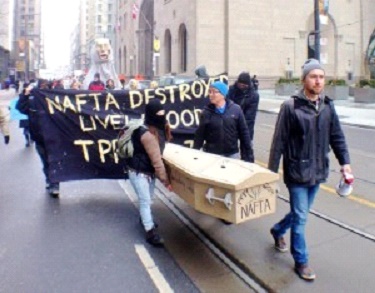
The political and economic elites are putting forth the same policies that contributed to the economic collapse. The top global example of this is the continued push for rigged corporate trade agreements. Public Citizen points out that research has shown that falsely called “free trade” deals have been a major cause of wealth inequality by pushing down wages and providing access to cheap resources which make the wealthiest wealthier. More rigged corporate trade will actually expand the wealth divide, not shrink it.
It is not only the facts President Obama and global trade activists ignore but the politics. The president’s political base has come out to protest controversial corporate trade agreements like the Trans-Pacific Partnership (TPP).
And now there is opposition in the Republican activist base as well that is calling it ObamaTrade. As we write this, we are ending a ten day campaign to stop fast track for the TPP that culminated in an intercontinental day of action.
The story of the TPP and the effort to pass Fast Track Trade Promotion Authority is also one which illustrates why the power structure fears the people. Politicians and the corporate media did their best to keep people ignorant about the TPP. For the first two years of negotiations by President Obama they were effective, but in the last two years there has been a rising tide of awareness and opposition. Numerous articles have exposed the TPP in the independent media and Wikileaks leaked sections of the secret agreement. Now, a ‘movement of movements’ has come together to oppose fast track. This can be seen on the website www.StopFastTrack.org where 130 organizations have joined together in a focused effort.
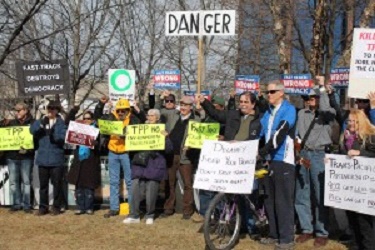
The result – the people are defeating transnational corporations and their lackeys in elected office. The success is quite amazing as the TPP seemed unstoppable less than a year ago. But, with awareness came mobilization. Unless something changes dramatically, fast track – and the TPP look dead for now.
What does this TPP experience show? First, the government tried to deceive the people because they knew if the people became aware and mobilized the treaty could not become law. Second, the people need to recognize we have tremendous power. We can stop something the wealthiest corporations in the world want. Third, people working on individual issues need to work together in a ‘movement of movements’ that supports each other and builds a mass movement that cannot be ignored. Finally, we need to be persistent because transnational corporate power will not give up. It will try again, and we need to be organized to stop them.

From Nation of Change and Yes! Magazine:
Leaked sections of the text, which is not available to the public, reveal that the TPP would also lead to significant changes to policy areas such as intellectual property rights (especially on the Internet), the creation and enforcement of environmental protections, and the labeling and marketing of agricultural products.
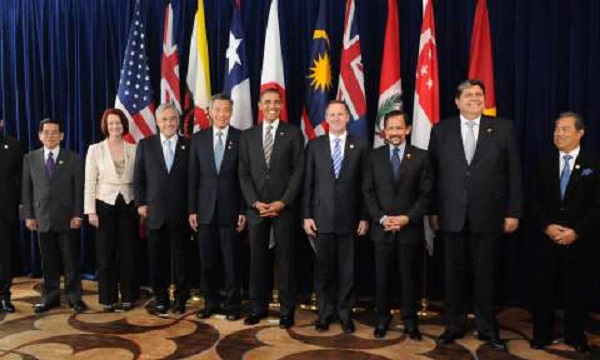
Eric Ross spent much of the morning on Friday, January 31 standing on an overpass above Interstate 90 in Bellevue, Wash., holding a 30-foot-wide banner that read: "Stop Reichert's NAFTA. Flush the TPP. Vote No on Fast Track."
The "Reichert" called out in Ross' sign is Congressman Dave Reichert, R-Wash., and at issue is his active support of the Trans-Pacific Partnership, a sprawling deal that would change the way international trade is conducted in 12 countries around the Pacific Rim, including the United States, Canada, Mexico, Vietnam, Peru, Australia, and Japan.
As opponents of the TPP frequently point out, the deal isn't just about trade: leaked sections of the text, which is not available to the public, reveal that the TPP would also lead to significant changes to policy areas such as intellectual property rights (especially on the Internet), the creation and enforcement of environmental protections, and the labeling and marketing of agricultural products.
Opponents of the deal say that the TPP would roll back the gains of almost every people's movement, especially those concerned with labor and the environment.
Ross says he received wide support for his banner, judging by the number of honks he heard from the vehicles passing beneath. An organizer with the Vashon Island-based organization Backbone Campaign, he says that illustrates that the work he and others have done to educate the public about the TPP over the past few years is starting to pay off.
"For the past 18 months, it was negotiated with essentially no media coverage, and activists had to teach their own representatives what the TPP was," Ross said. "But it isn't as secret as it used to be."
All eyes on fast trackOn Friday, that secrecy took another hit as opponents gathered in more than 50 cities across North America in a noisy, colorful, continent-wide day of rallies, marches, and teach-ins. Events were held in New York, Toronto, and Mexico City, but smaller towns turned out as well. People marched and rallied in Red Deer, Alberta, held a press conference in Fresno, Calif., and protested in the downtown office of Republican Congressman Charlie Dent in Allentown, Pa.
The Allentown rally was intended to put pressure on Mr. Dent not to support Trade Promotion Authority. Also known as "fast track," this is special legislation that would allow the Trans-Pacific Partnership to move more quickly through the United States legislature. Lawmakers would get to vote yes or no on the deal, oncsie it is approved by the trade representatives of the 12 negotiating countries, but would be prevented from altering any of its specificities.
Critics of fast-track say that it harms democracy by putting unelected trade negotiators and corporate advisers in charge of trade policy, while specifically excluding input from elected representatives. Some call it unconstitutional, since the United States Constitution grants only Congress the right to make trade agreements.
Events on Friday showed a new focus on demanding that elected representatives commit to opposing fast-track legislation. The march and rally in San Francisco, for example, criticized California Democratic Congresswoman Nancy Pelosi, who has refused to state her position on the fast-track bill since it was introduced by Senator Max Baucus, D-Mont., on Jan. 9.
In Washington state, volunteers with the Backbone Campaign entered the offices of U.S. Representative Dave Reichert, a Republican who actively supports fast track through the "Friends of the TPP" caucus, and issued him a "spineless citation." Democrats Suzan DelBene, Dennis Heck, Derek Kilmer, and Rick Larsen also received "spineless citations" for taking no position on the issue, while fellow House Democrat Jim McDermott received a thank-you letter (with an illustration of a spine, of course). McDermott has pledged to oppose fast track.
Their positions matter because the TPP would almost certainly be approved if Senator Baucus' fast-track bill passes, Lynne Dodson, secretary-treasurer for the Washington State Labor Council, told the crowd gathered in Seattle on Friday.
"No trade deal has ever been defeated once it got to fast track," she said.
Cause for celebrationEric Ross told YES! that he saw Friday's gathering in Seattle's Westlake Center as more of a celebration than a protest because, after years of hard work, the TPP’s momentum appears to be breaking down.
Two major chapters of the document's text were published by Wikileaks in December andJanuary, resulting in renewed and largely critical media coverage of the deal.
Next, right on the heels of the second leak, Senate Majority Leader Harry Reid told reporters on Jan. 29 that he opposes fast-track legislation and might refuse to bring the bill to a vote.
That led writer David Cay Johnston to wonder whether the TPP was now "dead:" "If Reid stands firm," he wrote in Al Jazeera, "it means new trade deals are likely to be worked out in the open, where the people and their elected politicians can debate the merits."
The TPP is also suffering from problems internal to its negotiations, which failed to meet the December 2013 deadline set for them by President Barack Obama. Talks in Singapore last December were bogged down over disputes about protections for agricultural products, among other issues, and no final agreement emerged.
In the wake of that failure, Japanese Economic and Fiscal Policy Minister Akira Amari told reporters that negotiators should meet again this month.
"The upcoming meeting is very important," Amari said, "as it will be held before U.S. midterm congressional elections in November."
Amari's statements indicate that Japanese negotiators will push for a deal to be hammered out before stateside electioneering begins in the summer.
For opponents of the TPP, that means that the time to act is now. If Friday's events were any indication, this vibrant movement seems likely to build on the victories it's already earned.
ABOUT JAMES TRIMARCOJames Trimarco wrote this article for YES! Magazine, a national, nonprofit media organization that fuses powerful ideas and practical actions. James is web editor at YES!and you can follow him@JamesTrimarco.

From Nation of Change and Acronym TV:
Given that NAFTA has contributed to a world that is a negative image of what was sold to us, it is no surprise that the global elite and the Obama administration have been negotiating the Trans-Pacific Partnership in secret.
It has been 20 years since NAFTA, (North American free Trade agreement) went into effect with the promise of more equality, more jobs, and a better, more prosperous and peaceful world for all of us.
Given that NAFTA has contributed to a world that is a negative image of what was sold to us, it is no surprise that the global elite and the Obama administration have been negotiating the Trans-Pacific Partnership in secret.
While the corporately controlled mainstream media ignore the implications of the TPP story, independent media and activists have come together as part of a growing movement of movements to organize, educate, and resist the fast track authority so important ant to the Obama administration.
Have we won? Is the TPP dead?"The social movement opposed to the TPP has done an excellent job stopping the current version of fast track introduced by Sen. Max Baucus" notes Kevin Zeese an organizer with Flush the TPP and Popular Resistance, but he cautions:
"This week Baucus will be confirmed as the new US ambassador to China and Sen. Ron Wyden will take his place. This creates a new risk. Sen. Wyden is a believer in corporate trade agreements. His constituents call him a “Free Traitor.” He has said he did not support the Baucus bill but we understand he may be working on a ‘new and improved’ fast track. This could be the greatest risk that we face in stopping fast track and stopping the TPP.
We need to be clear to all members of Congress NO FAST TRACK is acceptable. The Constitution has the appropriate balance between Congress and the president. We need the full checks and balances of Congress over ObamaTrade. So get ready for the next round — NO FAST TRACK is acceptable"
ABOUT DENNIS TRAINOR, JR.Dennis Trainor, Jr. (writer & host of Acronym TV) is also the director of the Occupy Wall St. documentary, American Autumn: an Occudoc. Acronym TV is an independent news program with over 21 thousand subscribers and 31 million video views and counting.

From Nation of Change, Popular Resistance and Occupy.com:
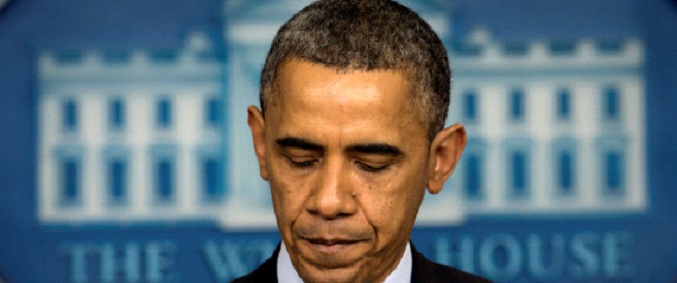
What seemed like an impossibility – stopping the Trans-Pacific Partnership – is now becoming an inevitability thanks to the solidarity of a “movement of movements“ that opposes rigged corporate trade agreements. Now, the people are on the verge of a major victory against transnational corporate power.
Comments by Senate Majority Leader Harry Reid indicate that Fast Track Trade Promotion Authority which is essential for passing the Trans-Pacific Partnership and other controversial trade agreements may be dead in the Senate as he has no plans to bring it to a floor vote.
This comes in the midst of a ten day blitz of movements that brings together Americans concerned with the environment, food safety, GMO labeling, healthcare, labor, worker rights, Internet and other issues.
Tens of thousands of phones calls and even more emails have been sent to Congress through coalition sites like Stop Fast Track. Friday is an intercontinental day of action and 50 protests are planned in the U.S., Canada and Mexico against corporate trade policies like NAFTA and the TPP.
President Obama did not help the cause of passage of fast track in the State of Union where he made a vague passing reference to trade promotion authority but no specific mention of the TPP or its Atlantic counterpart, TAFTA. His lukewarm comment showed Congress his administration will not be making fast track a top priority, probably because they have counted the votes and see it would be a likely legislative defeat for the administration. If President Obama is not going to risk offending voters, why should members of Congress?
This week, a poll conducted by Hart Research Associates, a Democratic pollster, and Chesapeake Beach Consulting, a Republican polling firm, announced that voter opposition to fast track authorization is broad, with 62% saying they oppose fast track authority for the TPP trade deal, versus 28% who say they favor it.
By large margins Americans recognize that on wages and jobs, the environment and food safety the TPP will make things worse. With a Democratic president, Republicans overwhelmingly oppose giving fast track authority to President Obama (87% oppose), as do Independents (66%), and the normally anti-corporate trade Democratic voters favor giving the Democratic president fast track (53%).
This poll will decrease the likelihood that House Republicans will allow a vote on fast track since nearly 90% of their voters oppose it. Already, Speaker Boehner put forward a high hurdle saying he would not allow a floor vote unless 50 Democrats came out for fast track. These poll results are not numbers that will be ignored in an election year when both parties are already unpopular.
Stopping the TPP seemed unlikely less than a year ago. But a campaign to educate the activist base of all the issues impacted by the TPP, pulling in more cautions non-profit organizations and unions as well as a growing awareness in the public, has resulted in what looked liked a sure thing trade agreement becoming so toxic that politicians up for re-election do not want to be associated with it. This success shows that the people have more power than they realize.
Of course, we are well aware that the corporations do not give up, that we need to remain active in our opposition in 2014 and that this issue will come back in future years. Activists must remain vigilant to stop corporate trade agreements that undermine all we work for.
At the same time we need to show a new path were fair trade can be designed for the betterment of people and the planet, negotiated in open with the participation of people all around the world. Our goal is not only to defeat fast track and the TPP but end the era of rigged corporate trade agreements negotiated in secret. It is a goal the social movement can achieve if we remain focused on the task.

From Nation of Change:
The big corporations and the Obama administration are trying to push through a giant new trade treaty that gives corporations even more power, and which will send even more jobs, factories, industries and money out of the country. This is the Trans-Pacific Partnership (TPP) and they are pushing something called “fast track” in Congress to help push it through.
We have to stop this, and we should take the momentum we have generated in our push-back on this to demand Congress and President Obama instead fix NAFTA first. Then fix all of our trade relationships to help working people on all sides of our borders. TPP, Fast Track And NAFTAThere has been a lot of news about the upcoming TPP trade agreement. The agreement is being negotiated in extreme secrecy in a corporate-dominated process that appears to be leading to an agreement that would give corporations even more power than they already have. Now there is a push to pass a process called fast track through Congress in order to enable the large corporations to strong-arm TPP into law mobilized organizations around the country to sound the alarm.
Those resisting this TPP/Fast Track effort have put out a lot of good, solid information detailing the problems that previous trade agreements have caused. For example Public Citizen’s Global Trade Watch issued a report, “NAFTA at 20: One Million U.S. Jobs Lost, Mass Displacement and Instability in Mexico, Record Income Inequality, Scores of Corporate Attacks on Environmental and Health Laws". This report compared the promises with which NAFTA was sold to the results we can measure 20 years later. Some of the effects of NAFTA that are highlighted in the report include:
• a $181 billion U.S. trade deficit with NAFTA partners Mexico and Canada,The data also show how post-NAFTA trade and investment trends have contributed to:
• middle-class pay cuts, which in turn contributed to growing income inequality;Former Michigan Congressman and Democratic Whip David Bonior made these points in a recent New York Times op-ed titled “Obama’s Free-Trade Conundrum“:
• In 1993, before NAFTA, the United States had a $2.5 billion trade surplus with Mexico and a $29 billion deficit with Canada. In 2012, the combined NAFTA trade deficit was $181 billion, even as the share of that deficit made up of oil imports dropped 22 percent.Jeff Faux of the Economic Policy Institute (EPI), in “NAFTA’s Impact on U.S. Workers,” laid out the four ways NAFTA hurt US workers:
By establishing the principle that U.S. corporations could relocate production elsewhere and sell back into the United States, NAFTA undercut the bargaining power of American workers, which had driven the expansion of the middle class since the end of World War II. The result has been 20 years of stagnant wages and the upward redistribution of income, wealth and political power.
NAFTA affected U.S. workers in four principal ways. First, it caused the loss of some 700,000 jobs as production moved to Mexico. …Second, NAFTA strengthened the ability of U.S. employers to force workers to accept lower wages and benefits. As soon as NAFTA became law, corporate managers began telling their workers that their companies intended to move to Mexico unless the workers lowered the cost of their labor. …
Third, the destructive effect of NAFTA on the Mexican agricultural and small business sectors dislocated several million Mexican workers and their families, and was a major cause in the dramatic increase in undocumented workers flowing into the U.S. labor market. This put further downward pressure on U.S. wages…
Fourth, and ultimately most important, NAFTA was the template for rules of the emerging global economy, in which the benefits would flow to capital and the costs to labor.
NAFTA has done harm to our economy and our jobs. But it is hardly just NAFTA that is hurting us – using the NAFTA template for other trade deals like our trade deal with China have compounded the damage. (The 2012 Korea-U.S. trade agreement has already cost 40,000 jobs and increased our trade deficit by $5.8 billion.)
The resulting loss of millions and millions of jobs, tens of thousands of factories, entire industries and continuing, enormous, humongous trade deficits now in the vicinity of $500 billion a year have done and are doing tremendous economic damage. This is wiping out our middle class and contributing to (if not being the major cause of) the terrible inequality that is tearing the country apart.
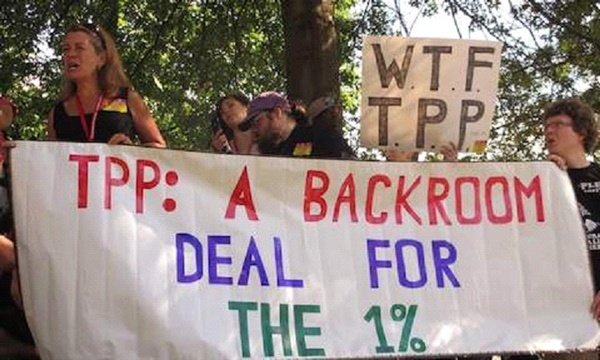
President Obama understood this during in the 2008 campaign when he promised over and over again to renegotiate NAFTA.
But then, just after taking office, he said we would have to wait. A February 20, 2009 Washington Post report, “NAFTA Renegotiation Must Wait, Obama Says,” tells the story:
President Obama warned on Thursday against a “strong impulse” toward protectionism while the world suffers a global economic recession and said his election-year promise to renegotiate the North American Free Trade Agreement on behalf of unions and environmentalists will have to wait.
We have waited. We have waited and waited. It is February 2014 and we have been waiting for five years. And by some coincidence jobs and the economy have not really recovered – and not at all for regular, working people. But instead of renegotiating NAFTA and other agreements to fix the problems that are sending jobs, factories, entire industries and $500 billion a year out of the country, we instead see the administration pushing the Trans-Pacific Partnership and fast track, which we all know will just make things worse.
The poor economy, decline of the middle class and incredible level of inequality have raised awareness that these trade deals have hurt us. Even with a near-complete media “blackout” of news about TPP and fast track, more and more people are “getting it” that the past trade agreements have driven wages down.
A recent poll asking the public their opinion of the fast track legislative push found “strong opposition,” “with a strong majority of Americans indicating their belief that trade agreements make the country worse off.” Sixty-two percent say they oppose fast track versus 28 percent who say they favor it. Also from the poll’s press release:
In households where a voter either owns or works for a small business, the verdict is clear: 64 percent say they expect TPP to hurt more than help small business.
On wages and jobs, the environment and food safety, voters clearly believe that TPP will make things worse. By a 35 point margin, voters believe that TPP would make things worse in terms of American wages (56-21). By a 30 point margin, voters believe that TPP would make things worse environmentally, not better (48-18). Among voters under age 35, 54 percent say that TPP would have an adverse environmental impact. A full 63 percent believe that TPP would make U.S food safety worse.
The public “gets it.” People “get it” that big companies have been using “NAFTA-style” trade agreements to cross democracy’s borders to escape democracy’s regulation and decent wages. People “get it” that big companies have been using these “trade” agreements to drive down wages here, pressuring people to accept concessions or lose their job and pressuring communities to give tax concessions.
The last thing people want is any more of this. And in our country decisions should be based on what the people want.
Fix NAFTA FirstOnce again we are rushing to do more of something that hurts the country, because it benefits a few people who have tremendous political influence. This time, instead of pushing through yet another job-killing treaty that enriches the billionaires at the expense of the rest of us, let’s stop. Take a breath. Take control of the process. Then continue the momentum and understanding this fight has generated to demand our leaders actually fix some problemsbefore rushing to make things worse. This time.
It is not only the wrong time to bring fast track up for a vote in Congress, it is time to scrap the TPP agreement. Instead we need to fix NAFTA first.
Fix NAFTA first. It is time to renegotiate NAFTA and set it up as a new kind of trade template that works for the 99 percent here and in other countries. Then fix the rest of the trade regime and make it work for We, the People instead of a very few wealthy people.
Trade is a good thing, but not the way we have been doing it. Trade done right can lift people on all sides of all borders. It can and does increase prosperity. But the way the giant corporations have captured and rigged the current negotiating process is hurting our country – and the rest of the world. It is creating terrible inequality and terrible economic imbalances around the globe.
What should trade-done-right look like? That’s for another post. But here is a hint: In an agreement negotiated by a democracy, wouldn’t it be a trade violation to threaten to move someone’s job out of the country if they ask for a raise or don’t accept a wage cut?

From Nation of Change:
Because of these leaks we know that the TPP has an intellectual property section that will override government rules that limit the power giant corporations can wield against smaller competitors and the general public.
A law affecting content on the Internet that was rejected by Congress shows up in a trade agreement designed to bypass and override Congress. Small, innovative companies that manufacture low-cost, generic drugs find their products blocked.
Those are examples of what is in store based on provisions in the Trans-Pacific Partnership (TPP), which is now being negotiated by the United States and 11 other nations, that have been leaked to the public. The leaks appear to show that provision after leaked provision will take power away from democracy and countries and hand it to the biggest corporations. No wonder these giant, monopolistic corporations want Congress to approve Fast Track before they – and We the People – get a chance to read the agreement.
Because of these leaks we know that the TPP has an intellectual property section that will override government rules that limit the power giant corporations can wield against smaller competitors and the general public. Intellectual property (IP) is a term that covers patents, copyrights, trademarks, trade secrets, industrial designs and similar ‘intangible assets.” (Click here for the IP chapter that was leaked to Wikileaks.)
The rigged process in which only giant corporate interests are represented at the talks of course produces results that are more favorable to those giant corporations than to their smaller, innovative competitors and regular people around the world. The rigged “fast track” process enables these interests to push the agreement through Congress before there is time to organize a public reaction.
TPP And Fast TrackTPP is a “trade” agreement that has little to do with trade and everything to do with giving the giant corporations the power to override what governments and their people want. The agreement follows the pattern of the trade agreements that have forced millions of jobs and tens of thousands of factories out of the United States, placed giant corporations in a dominant-power position that is threatening our democracy and sovereignty, and have dramatically accelerated the transfer of wealth from regular people to a few billionaires worldwide.
TPP is being negotiated in secret with consumer, environmental, labor, health, human rights and other “stakeholder’ groups excluded from the table. But the interests of the giant corporations are at the table, with the negotiators either already well-compensated by the corporate interests or in a position to be well-compensated later after leaving government (which many of them tend to do immediately after ending their role in trade negotiations).
To help push TPP through, the giant corporations are trying to get Congress to give up its constitutional responsibility to initiate and carefully consider the terms of trade agreements. The corporations are pushing for Congress to pass “fast track” trade promotion authority, which brings in a process where Congress gets a very limited amount of time after first seeing the agreement to evaluate it and then vote, limits how much they can debate it and prohibits them from amending it in any way. This gives the corporations the opportunity to set up a huge PR campaign to pressure Congress to pass it, before the public has time to organize a response – never mind even read the agreement.
Intellectual Property and Drug PricesOne example of the way the intellectual property provisions favor giant, multinational corporations over smaller, innovative corporations and regular people around the world is in pharmaceutical prices.
A company with a drug patent is granted a monopoly to sell the drug at any price they choose with no competition. Currently a drug might be patented for a limited number of years in different countries. When the patent runs out other companies are able to manufacture the drug and the competition means the drug will sell at a lower cost.
Leaked documents appear to show that TPP will extend patent terms for drugs. Countries signing the agreement will scrap their own IP rules and instead follow those in TPP. So giant drug companies will have the same patent in all countries, for a longer period, and the patent will prevent competition that lowers drug prices.
Currently smaller, innovative companies can produce “generic” drugs after patents run out. Because of competition these drugs can be very inexpensive. Walmart, for example, sells a month’s supply of many generic drugs for $4, while drugs still under patent protection can cost hundreds or even thousands. This is of particular concern to poor countries that will be under TPP rules.
Please read Expose The TPP’s section The Trans-Pacific Partnership and Public Health, which begins:
The TPP would provide large pharmaceutical firms with new rights and powers to increase medicine prices and limit consumers’ access to cheaper generic drugs. This would include extensions of monopoly drug patents that would allow drug companies to raise prices for more medicines and even allow monopoly rights over surgical procedures. For people in the developing countries involved in TPP, these rules could be deadly – denying consumers access to HIV-AIDS, tuberculosis and cancer drugs.
What You Can See, Do And Say On The InternetYou might remember when many websites on the Internet “went dark” for 24 hours to protest the proposed SOPA and PIPA laws. According to the Electronic Freedom Foundation’s (EFF) SOPA/PIPA: Internet Blacklist Legislation,
The “Stop Online Piracy Act”/”E-PARASITE Act” (SOPA) and “The PROTECT IP Act” (PIPA) are the latest in a series of bills which would create a procedure for creating (and censoring) a blacklist of websites. These bills are updated versions of the “Combating Online Infringements and Counterfeits Act” (COICA), which was previously blocked in the Senate. Although the bills are ostensibly aimed at reaching foreign websites dedicated to providing illegal content, their provisions would allow for removal of enormous amounts of non-infringing content including political and other speech from the Web.
… Had these bills been passed five or ten years ago, even YouTube might not exist today — in other words, the collateral damage from this legislation would be enormous.
Larry Magid explained at the time, in What Are SOPA and PIPA And Why All The Fuss?
The bill would require sites to refrain from linking to any sites “dedicated to the theft of U.S. property.” It would also prevent companies from placing on the sites and block payment companies like Visa, Mastercard and Paypal from transmitting funds to the site. For more, see this blog post on Reddit.
The problem with this is that the entire site would be affected, not just that portion that is promoting the distribution of illegal material. It would be a bit like requiring the manager of a flea market to shut down the entire market because some of the merchants were selling counterfeit goods.
… Opponents say it would create an “internet blacklist.”
… There is also worry that SOPA and PIPA could be abused and lead to censorship for purposes other than intellectual property protection.
Congress decided to reject SOPA and PIPA. But the provisions of SOPA and PIPA are back, this time in the TPP, which would override what Congress wants.
Please read the EFF’s Trans-Pacific Partnership Agreement page.
We’ve seen how this works too many times. The giant corporations promise jobs and prosperity to get their way, but then We the People end up with fewer jobs and a falling standard of living while a few billionaires and executives pocket the difference. Instead of letting the giant corporations push through yet another job-killing agreement that gives them even more wealth and power let’s take control of things and fix the agreements that have hurt us, our economy and our democracy. Fix NAFTA First!

From Nation of Change:
Notably, nominee Robert Holleyman is a former lobbyist who led efforts to pass the Stop Online Piracy Act legislation, better known as SOPA, when he was leader of the Business Software Alliance.

This morning, President Obama nominated Robert Holleyman as deputy U.S. trade representative. If confirmed by the U.S. Senate, Holleyman will help lead the effort to pass the controversial Trans-Pacific Partnership trade deal.
Notably, Holleyman is a former lobbyist who led efforts to pass the Stop Online Piracy Act legislation, better known as SOPA, when he was leader of the Business Software Alliance. The SOPA debate (along with its sister legislation, PROTECT-IP, in the Senate) brought a spotlight on industry efforts to undermine Internet freedom through what many considered to be draconian intellectual property policy.
Critics have pointed out, the leaked TPP documents relating to TPP negotiations reveal that the U.S. is seeking to resurrect portions of the SOPA bill through the TPP, namely, holding Internet Service Providers liable for hosting copyright infringement and extending the copyright life of certain corporate-owned copyrights. As Washington Post blogger Henry Farrell noted, the proposed TPP provisions suggest the deal will advance intellectual property rules that “could not [be] achieved through an open democratic process.”
During the SOPA debate, Holleyman was chief executive of the Business Software Alliance, a trade group for software companies including IBM. Holleyman commended then-Judiciary Chairman Lamar Smith for his work in sponsoring SOPA and for pushing for its passage. In 2012, as the bill worked its way through Congress, the BSA spent over $1.6 million on lobbying. After widespread outrage against the bill, which eventually failed, BSA withdrew official support and sought similar policy changes through other legislation.
If the Senate approves Holleyman as the next deputy trade representative, he will have another opportunity to advance SOPA-style policy.
Last week, Republic Report broke several stories regarding the TPP, including bonuses paid by CitiGroup and Bank of America to officials also tapped by the administration to lead the TPP deal. We also reported on media companies and their lobbying efforts on the bill — which have been extensive, despite the lack of coverage media outlets are devoting to the issue.
This article originally appeared on Republic Report.
ABOUT LEE FANGLee Fang is an investigative researcher and contributing author for NationofChange. A resident of Sacramento, CA, Lee has written for the Boston Globe, The Nation, and ThinkProgress.org.

Sum Of Us:
When one contemplates the Australian prime minister travelling to "enter" the world stage and when in a certain North American country he calls that country Canadia, and later crosses the border to the currently most powerful country in the world and denies climate change and all the disasters coming with it, we have to understand, with horror, the implications of this "head of government" being in charge of Australia being ruled by the US government's TPP proponents, we are in for a rough ride.
Many thanks to the SUM OF US group for their actions and update.
Almost two weeks ago we took the fight against the Trans Pacific-Partnership (TPP) right to the doorstep of our democratic representatives in Canberra. We delivered a little less than 150,000 SumOfUs' members signatures calling for the TPP to be made public.
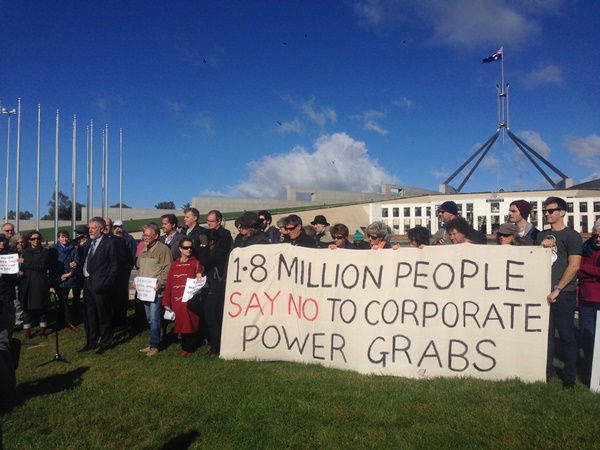
SumOfUs members in Canberra
But not only were SumOfUs members and signers raising their voices against the secrecy of the trade deals. Other partner groups Avaaz and GetUp also brought members’ signatures totalling a staggering 1.8 million Australians demanding that the TPP be made public. The press and those present also heard from industries which will be negatively affected by the trade deals, MPs who oppose the TPP and members of communities whose rights are under attack as a result of these.
The need to open democracy has never been more urgent. The little we know about the TPP is dangerous enough:
It will give corporations the power to sue governments for diminishing their profits in a secret court known as the Investor State Dispute Settlement.In short, the TPP is the handover of our democracies to corporations and their unstoppable pursuit of profit, at the expense of people.
If the details of the trade talks are made public, we will be able to keep fighting to make sure corporate power is out of our democracies with the determination of our members at the forefront.
Thank you for standing against the secrecy of the TPP.
Thank you for all that you do,
Paul, Hannah, Ledys and the rest of us at SumOfUs.






Red Jos: HUMAN RIGHTS ACTIVISM
Mannie and Kendall Present: LESBIAN AND GAY SOLIDARITY ACTIVISMS
Mannie's weblogs may be accessed directly by clicking on to the following links
Activist Kicks Backs - Blognow archive re-housed - 2005-2009
RED JOS BLOGSPOT (From January 2009 onwards)

This page was created on 24 APRIL 2014 and updated on 26 NOVEMBER 2016
PAGE 180